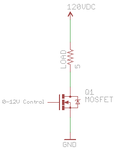Clement10
Newbie level 3
Dear All,
I am designing a 1.2KW dummy load consisting of a 5 Ohm power resistor and a MOSFET dc switch. The input voltage for the load is 120VDC and the max working current is 10A. The MOSFET formed part of the dummy load and it will dissipating 700W of power.
I want to use a TO-247 package MOSFET (IXFH120N20P, Pd rated at 714W) to do the job. Does a small package size like TO-247 with a heat sink able to handle this large amount of power or I have to choose ISOTOP/MOSFET module for better thermal management?

I am designing a 1.2KW dummy load consisting of a 5 Ohm power resistor and a MOSFET dc switch. The input voltage for the load is 120VDC and the max working current is 10A. The MOSFET formed part of the dummy load and it will dissipating 700W of power.
I want to use a TO-247 package MOSFET (IXFH120N20P, Pd rated at 714W) to do the job. Does a small package size like TO-247 with a heat sink able to handle this large amount of power or I have to choose ISOTOP/MOSFET module for better thermal management?
